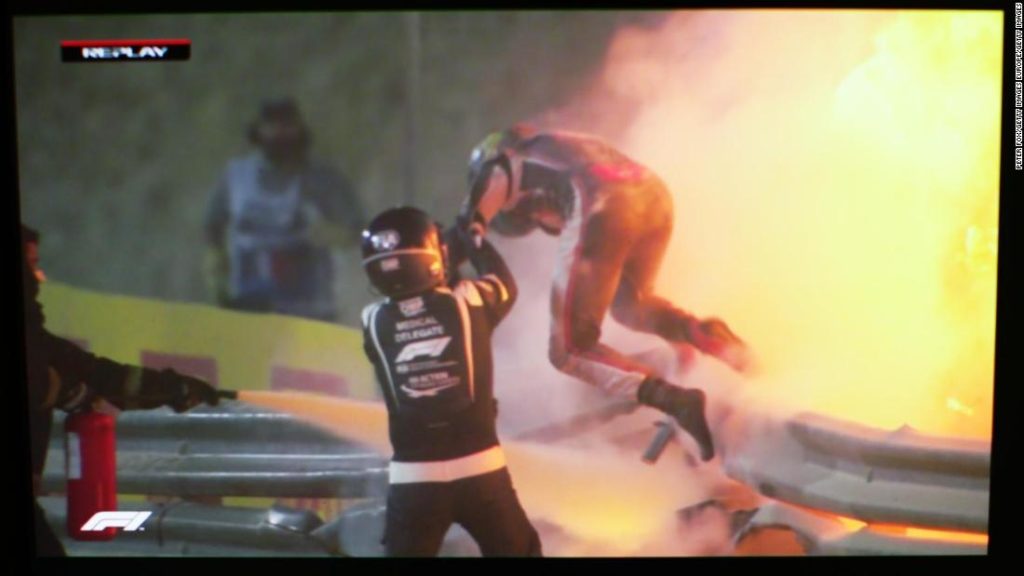“If you ask me how long it was, I would have said a minute … minute-and-a-half.”
That Grosjean was able to climb out of the wreckage and into a medical car shortly after the crash appeared nothing short of miraculous.
What must make the Frenchman’s memories of the crash more troubling is knowing that if the car had become angled slightly differently, or if the barrier had not shifted as much as it did, then he might not have made it out alive.
“I remember everything about it, every single detail — from the moment I started undoing my seat belt, to the moment I realized I was stuck in the car thinking it was okay, they [race safety staff] would come and help me to jump out, then realizing there’s fire,” says Grosjean.
“I realized after a few attempts of jumping out that I was completely stuck and thinking that I’m going to burn here. I asked myself: where is it going to start? By the foot? By the hands? By the head? Is it going to be painful or not?”
Then he thought of his family, thousands of miles away back home.
“I was in peace and accepting it, but then that’s where I thought about my kids and that I couldn’t leave three kids without a dad,” says Grosjean of sons Sacha and Simon and daughter Camille.
“I had to try a last attempt. That moment was more like a reset button for my brain.”
The race in Bahrain proved to be Grosjean’s last in Formula One.
His hands blistered from burns suffered during the crash, the 34-year-old says he still has work to do to regain full mobility.
“It’s two, two-and-a-half months now and two-and-a-half months that I am in pain,” says Grosjean. “I could use painkillers, but psychologically I stopped painkillers, so I don’t want to get back at it.”
Still battling the physical repercussions of the crash, Grosjean has also had time to consider its emotional consequences as he prepares to get back behind the wheel and race again.
After an F1 career that saw 10 podiums in 179 race starts, he has signed up to compete in IndyCar in the United States with Dale Coyne Racing. His first testing session takes place on Monday.
“Driving on my own won’t be a problem at all,” says Grosjean.
“I think the question that I have and can’t answer right now is how is it going to be in the peloton with other drivers, the race starts, and so on; is it going to bring back memories? Is it going to frighten me? But I’m optimistic that it’s going to be alright.”
IndyCar races are contested across different types of track — ovals, street circuits and road courses. Grosjean has decided for now that he won’t race at oval events, which includes the iconic Indy 500, in light of the crash in Bahrain.
“If I was 25 and single, I would go and do the ovals, that wouldn’t be a problem,” he says.
“But what I cannot accept right now is putting my wife and my kids in the same situation as they were in Bahrain.
“Ovals, we know it’s risky, we know it’s very high speed. And the crashes — even though, touch wood, most of the time drivers are okay — are very impressive. I don’t want them to be again in front of the TV, see a big crash and ask themselves: how is he doing?”
“I never stopped thinking about Jules and I always kept in touch with mainly his father,” says Grosjean, who keeps one of Bianchi’s helmets on his desk at home and wears “JB17” on his own helmet during races.
“I was one of the guys against the halo. I didn’t like it,” adds Grosjean.
“I didn’t think it was great for motorsport. I must say I changed my mind big time and that I won’t race a car with no halo because it’s saving our lives.
“Jules saved my life with the introduction of the halo. We’re going to learn from Anthoine and from myself and just make sure that we get better and better.
“It’s never going to be safe. Motorsport is dangerous, we know that. But if we can learn, if we can make it better and if we can bring that to real life road cars, then it’s very impressive.”
While IndyCar remains Grosjean’s immediate priority, the IMSA championships in North America, the prestigious Le Mans 24 hour race in France and the Dakar Rally are all potentially on his radar.
The crash in Bahrain, Grosjean says, helped him to recognize what he really wants at this stage of his career: “new things, new tracks, new people, new atmospheres.”
He says he’s been overwhelmed by the support he’s received over the past few months — from people in the streets, in supermarkets, on social media, and, of course, from his family; the incident has cemented his children’s view that he’s a superhero.
“I don’t feel like a superhero, I feel like a dad that has done what he had to do to go and see his kids,” Grosjean says of the crash.
“That was really the target when I was in the fire, it was jumping out to go and see my kids. They were the energy that I had.”
You may also like
-
Super League: UEFA forced to drop disciplinary proceedings against remaining clubs
-
Simone Biles says she ‘should have quit way before Tokyo’
-
Kyrie Irving: NBA star the latest to withhold vaccination status
-
Roger Hunt: English football mourns death of Liverpool striker and World Cup winner
-
‘Every single time I lift the bar, I’m just lifting my country up’: Shiva Karout’s quest for powerlifting glory

